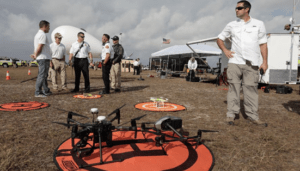
The growth of public-safety drones may be grounded before it can soar unless the industry makes key changes.
That’s the conclusion of a report released last week by DRONERESPONDERS.
The alliance, billed as “the world’s fastest growing non-profit program supporting public safety UAS,” released Public Safety UAS Flight Training and Operations last week at the National Institute of Standards and Technology headquarters.
Among the key findings:
- “The growth to maturity of many existing public-safety UAS programs remains inhibited by a lack of funding, resources, and formalized standards surrounding remote pilot training and flight operations.
- Public safety UAS program managers remain skeptical about the ability of most external contractors and vendors to train drone operators beyond their FAA Part 107 certification.
- The proficiency of many remote pilots in the public safety sector remains questionable due to a lack of training standards, collateral duty requirements, and limited flight hours.
- Standardization for public safety UAS operations can only be accomplished by a consortium of capable partners who achieve buy-in from key sector stakeholders.”
“While a lack of program resources and finding is continuing to hamper the growth of many public safety drone operations, there are some low-cost solutions that can be quickly adopted to improve safety,” DRONERESPONDERS Chief of Staff Justine Hollingshead said.
The report recommends UAS managers start using a tracking tool known as a position task book to verify more rigorous testing of drone flight crews before the launch of any drone program.
“The use of [position task books] is a proven tool to help train and certify key personnel. We urge all UAS programs to move quickly towards implementing them,” Hollingshead added, noting that fewer than half of all pilots are using such a tool.
DRONERESPONDERS plans to introduce a position task book template for public safety drone agencies by the end of the year.
The template will be based on generally accepted remote pilot skill sets.
In addition, the group also endorsed the NIST Standard Test Methods for Small Unmanned Aircraft Systems to be used position task books for evaluating pilot proficiency.
Jason is a longstanding contributor to DroneLife with an avid interest in all things tech. He focuses on anti-drone technologies and the public safety sector; police, fire, and search and rescue.
Beginning his career as a journalist in 1996, Jason has since written and edited thousands of engaging news articles, blog posts, press releases and online content.
Email Jason
TWITTER:@JasonPReagan
Subscribe to DroneLife here.







[…] Source link […]